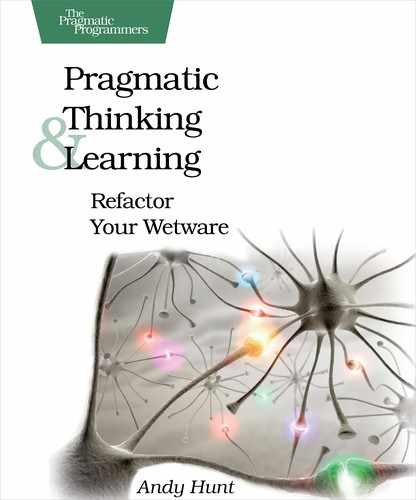Learn by Teaching
One of the simplest and most effective techniques to learn something is to try to teach it. Teaching in this context doesn’t necessarily mean grabbing the chalk and heading into the classroom; there are several different ways to go about it. You can begin with simple verbal “rubber ducking.” In The Pragmatic Programmer, we described the following scenario.
You’re stuck with a difficult bug. You’ve already spent a lot of time on it, and the deadline is looming. So, you ask a co-worker for help. They walk over to your screen, and you begin to explain what’s going on—and what’s going wrong. Before you get very far into the description, a flash of insight smacks you in the head, and you exclaim, “A-ha!” You’ve found the bug. Your bemused co-worker, who never had to say a word, shakes their head and walks back to their own office. To save some wear and tear on the carpet (and your co-worker), we suggest you place a surrogate—a yellow rubber duck, for instance—near your screen and, when you get stuck, just “talk to the duck.”
Talk to the duck.

Another useful approach is to try to explain your material to a child or someone outside your field of expertise. The trick is to do so in terms they can understand. This is a great opportunity to explain what you really do for a living to your great Aunt Edna, and it’s a great exercise to start to see things from your audience’s point of view and to develop metaphors that will help explain and clarify the material you’re working with. You may be surprised by what you learn and what insights come to you during the process.
Finally, you can reach out and try to teach a larger, more responsive audience. Start by offering to give a talk at a local user group meeting, or pen an article for a newsletter or magazine. There’s nothing like the prospect of a lot of bright people picking at your every word to help clarify your thinking. And that’s the real benefit to teaching in general; it clarifies your own understanding and reveals many of your underlying assumptions.
Remember the medical school mantra:
| Recipe 32 | See it. Do it. Teach it. |
As I mentioned earlier, constant retrieval is very effective for learning. Having to “go back to the well” while preparing to teach, and while having to think on your feet to respond to questions, all helps strengthen your neural connections.
